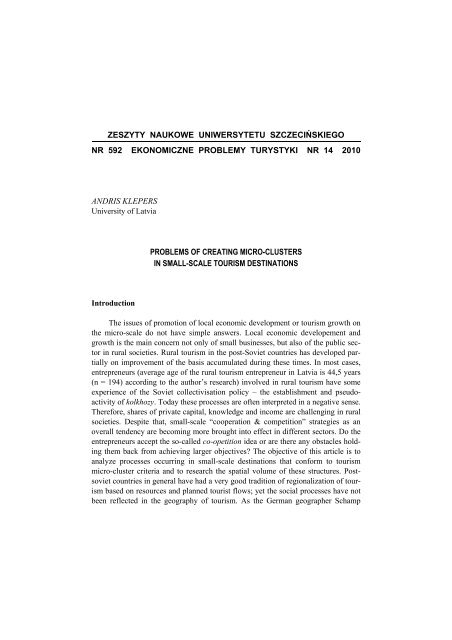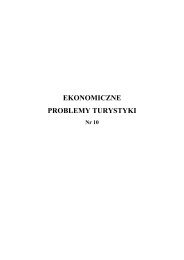Zeszyt naukowy - caÅoÅÄ - WydziaÅ ZarzÄ dzania i Ekonomiki UsÅug
Zeszyt naukowy - caÅoÅÄ - WydziaÅ ZarzÄ dzania i Ekonomiki UsÅug
Zeszyt naukowy - caÅoÅÄ - WydziaÅ ZarzÄ dzania i Ekonomiki UsÅug
You also want an ePaper? Increase the reach of your titles
YUMPU automatically turns print PDFs into web optimized ePapers that Google loves.
ZESZYTY NAUKOWE UNIWERSYTETU SZCZECIŃSKIEGO<br />
NR 592 EKONOMICZNE PROBLEMY TURYSTYKI NR 14 2010<br />
ANDRIS KLEPERS<br />
University of Latvia<br />
PROBLEMS OF CREATING MICRO-CLUSTERS<br />
IN SMALL-SCALE TOURISM DESTINATIONS<br />
Introduction<br />
The issues of promotion of local economic development or tourism growth on<br />
the micro-scale do not have simple answers. Local economic developement and<br />
growth is the main concern not only of small businesses, but also of the public sector<br />
in rural societies. Rural tourism in the post-Soviet countries has developed partially<br />
on improvement of the basis accumulated during these times. In most cases,<br />
entrepreneurs (average age of the rural tourism entrepreneur in Latvia is 44,5 years<br />
(n = 194) according to the author’s research) involved in rural tourism have some<br />
experience of the Soviet collectivisation policy – the establishment and pseudoactivity<br />
of kolkhozy. Today these processes are often interpreted in a negative sense.<br />
Therefore, shares of private capital, knowledge and income are challenging in rural<br />
societies. Despite that, small-scale “cooperation & competition” strategies as an<br />
overall tendency are becoming more brought into effect in different sectors. Do the<br />
entrepreneurs accept the so-called co-opetition idea or are there any obstacles holding<br />
them back from achieving larger objectives? The objective of this article is to<br />
analyze processes occurring in small-scale destinations that conform to tourism<br />
micro-cluster criteria and to research the spatial volume of these structures. Postsoviet<br />
countries in general have had a very good tradition of regionalization of tourism<br />
based on resources and planned tourist flows; yet the social processes have not<br />
been reflected in the geography of tourism. As the German geographer Schamp

















